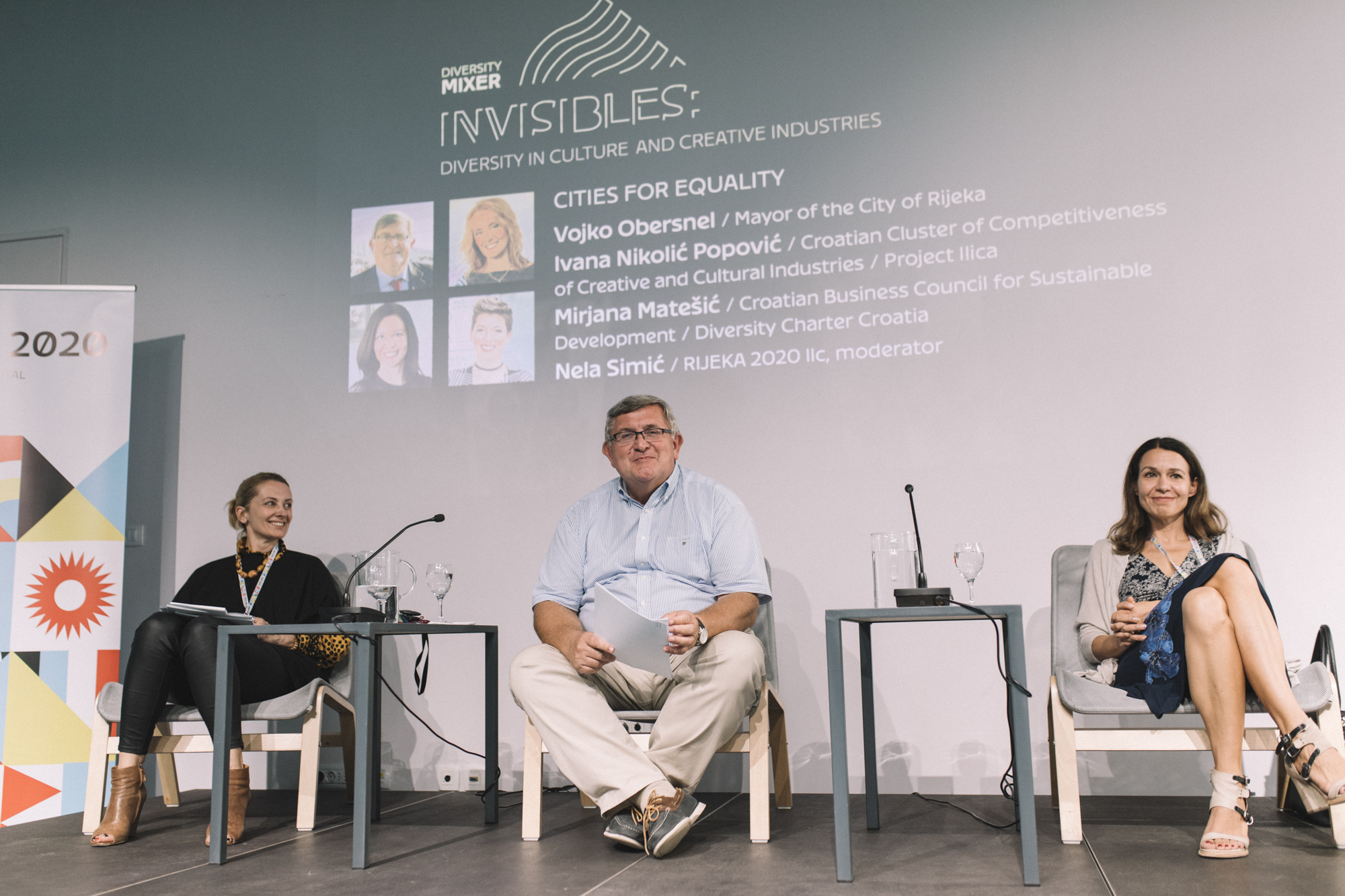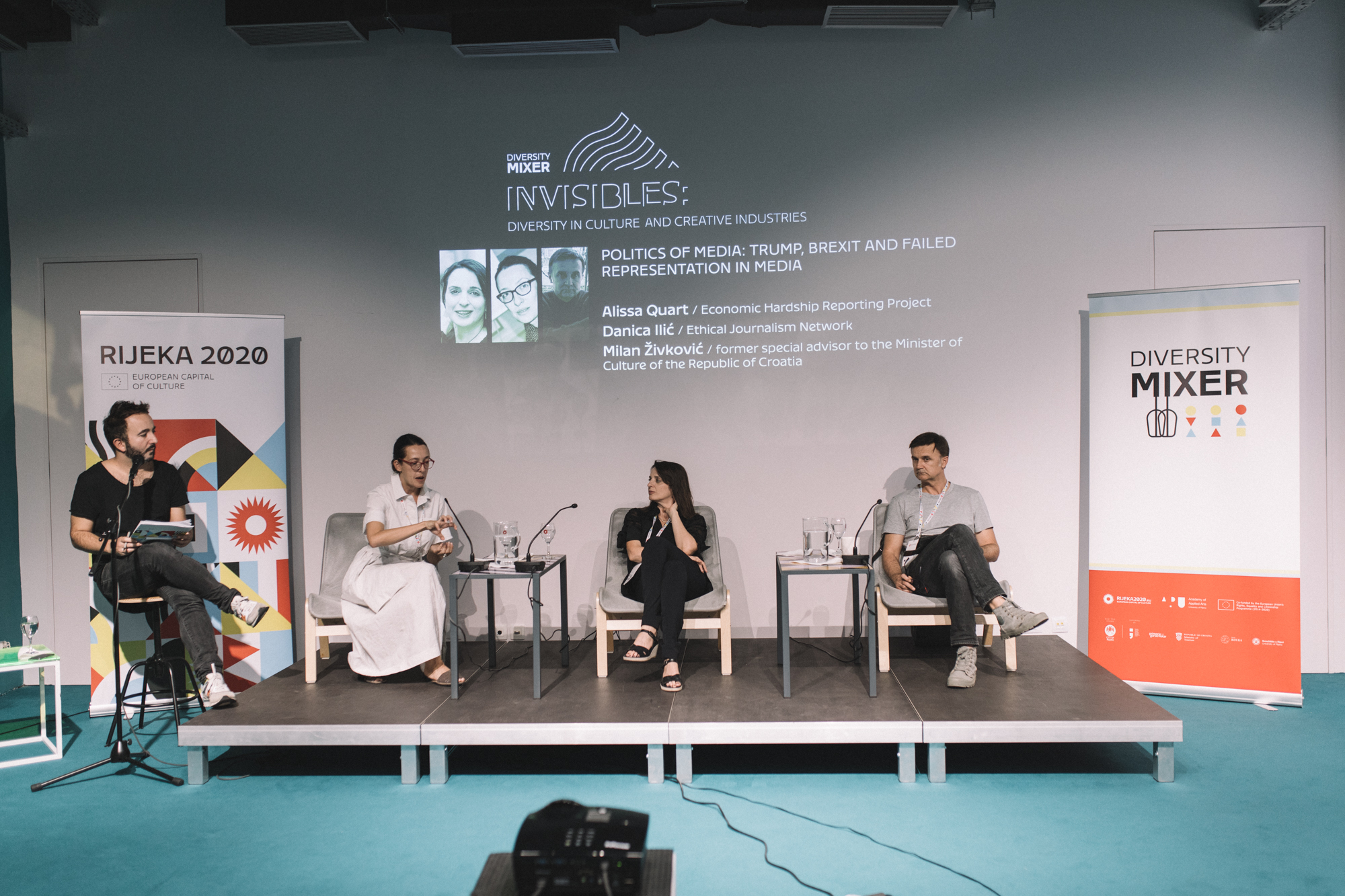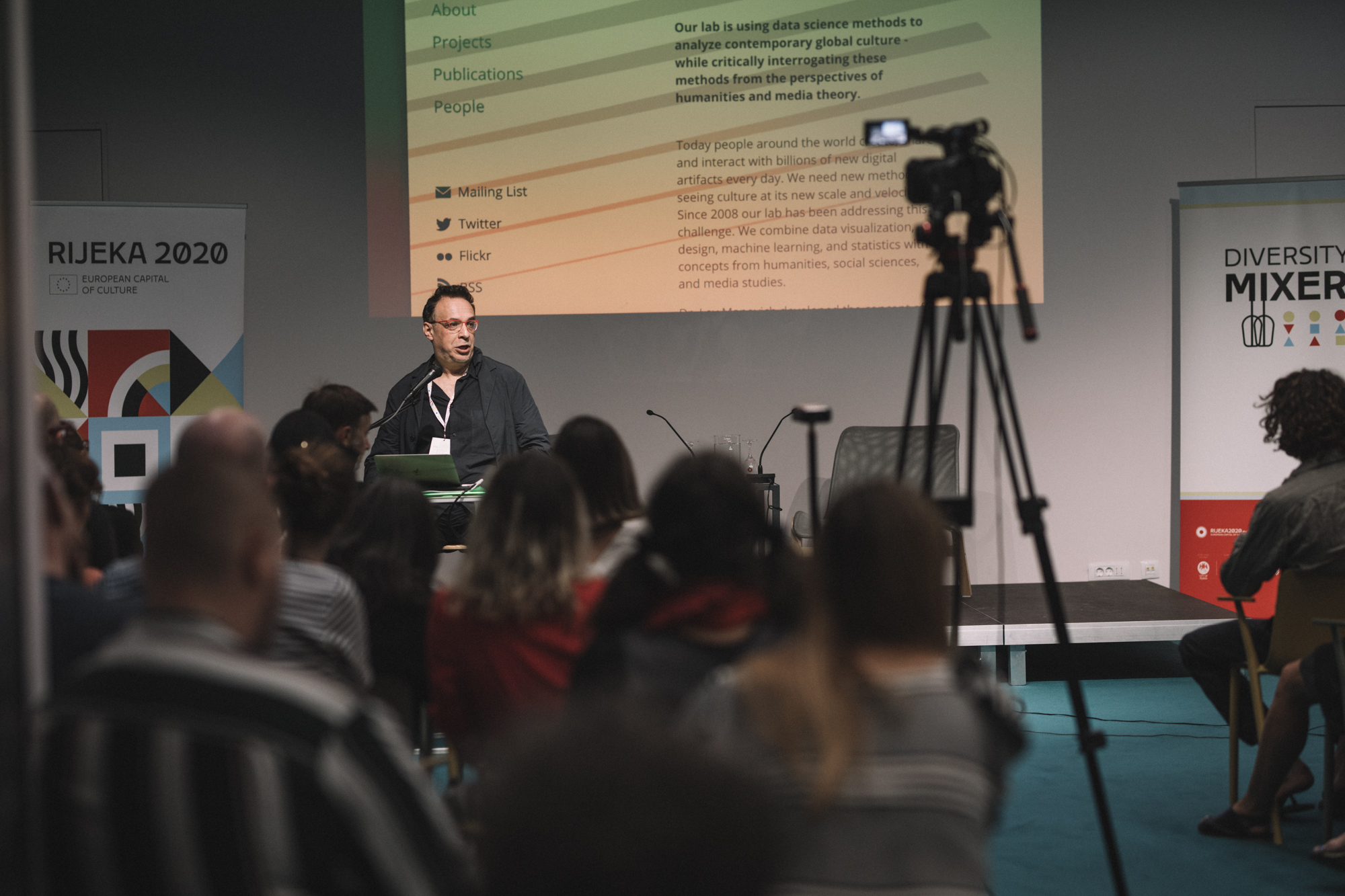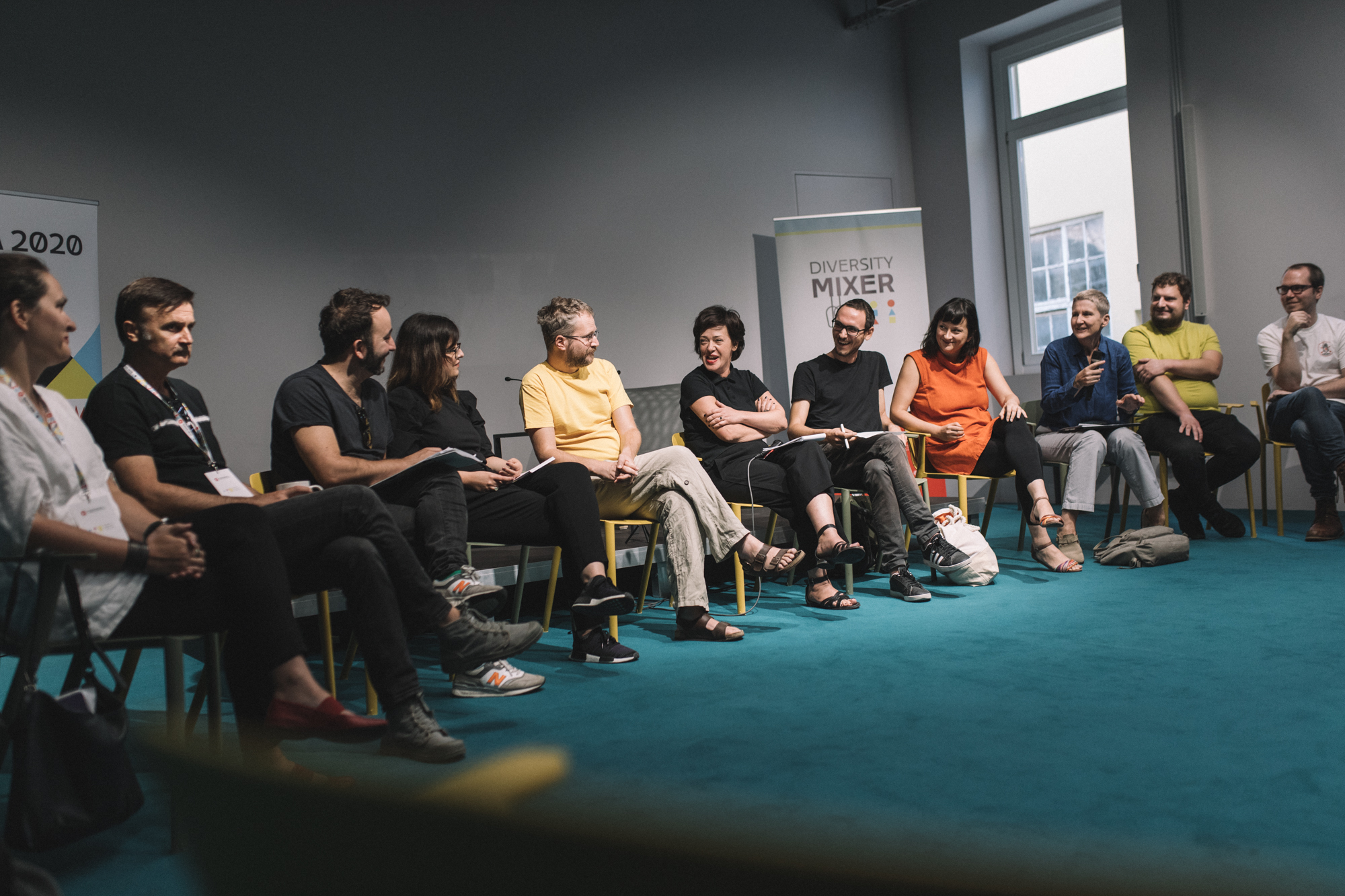From September 12-14, the International Conference Diversity Mixer, organised by Rijeka 2020 – European Capital of Culture and the Academy of Applied Arts, was held in the premises of RiHub (I. Grohovca 1a). The conference gathered 30 domestic and international lecturers in the fields of culture and creative industries which covered the basic theme of diversity in their lectures through theory, scientific research, the old and new media, music, video games and performing arts.
What kind of influence does role assignment in dramas and TV series have on the generations that grow up watching them? How does cultural and creative content relate to the sex/gender or age of cultural workers? What is real diversity and is it possible to control diversity? These and many other questions were the topic of the three-day international conference Diversity Mixer, which gathered around two hundred participants, mostly employed in cultural institutions and representatives of cultural and creative industries, but also students, workers from non-governmental organisations, artists and people from public authorities.
The first day of the conference was a sort of theoretical introduction to the topic and started with the lecture Redistribution and Recognition: the Two Axes of Cultural Politics? by Milan Živković, former media advisor of the Minister of Culture of the Republic of Croatia, followed by a presentation of research into structural inequalities in cultural and creative industries by Mark Taylor, the University of Sheffield (Panic! Class, Taste and Inequalities in the Creative Industries) and Jake Primorac from the Institute for Development and International Relations (Who is Missing? On Structural Inequalities in Cultural and Creative Industries). The afternoon was reserved for two panel discussions, the first of which, Can Diversity Shake the Music Industry? was devoted to music, i.e. the music industry. The trends of diversity in the politics of the music industry in the region and globally, the position of female musicians on the regional scene and the working conditions were discussed by Ilija Milošević from Universal Music Serbia, Antonela Marušić, a freelance writer and journalist, and Luka Benčić, a musician and journalist. After a short break, a panel The Cities of Equality followed, on the topic of diversity and equality in the context of cities’ development with the panellists Vojko Obersnel, the Mayor of Rijeka, Ivana Popović of the Croatian Cluster of Competitiveness of Creative and Cultural Industries and Mirjana Matešić of the Croatian Business Council for Sustainable Development. Obersnel pointed out that, when speaking about equality at the city level, the subject ranges from the equality of access to the educational system, through equality in access to information all the way to equality in the opportunity of involvement in culture, which is what the project European Capital of Culture addresses, while Ivana Popović pointed out the importance of the inclusion of the community in the cultural life of the city. Mirjana Matešić spoke about equality from the perspective of the economy and pointed out the new European trend of discrimination research, which aims to affect the employers’ partiality when choosing potential employees. Namely, the results have shown that, although their resumes are identical, minorities (women, members of the Muslim religion…) are disadvantaged from the very start by not being invited to the next round of selection, which is a devastating fact.

On the second day of the conference, the lectures dealt with the topic of the media in the context of diversity. Danica Ilić from the Ethical Journalism Network Organisation gave the lecture Diversity in the Media: Between a #Hashtag and BBC Crime Drama, the basic idea of which was to show how an idea on digital media that will take down the stereotypes on minority groups and spread the diversity topic throughout the public sphere is not viable since only a few of the mentioned minority groups even have access to the media, i.e. are employed in journalism. The lecture that followed was by Alissa Quart, Executive Director of the Economic Hardship Reporting Project and a columnist for some of the most influential newspapers such as The New York Times and The Guardian. In her lecture How to Return Precarious Journalists and Reporting on Diversity in the Media, Quart referred to the American journalist today, pointing out the importance of the non-profit journalist sector in the age of Trump and the trend of transmitting fake news – topics that were also covered by the panel Media Politics: Trump, Brexit and Betrayed Representation that followed. Alissa Quart, Danica Ilić and Milan Živković participated. The two other panels covered the topic of diversity using the example of theatre and the gaming industry. Olga Dimitrijević, freelance dramatist of the Croatian National Theatre Ivana pl. Zajca, and Nataša Antulov, the co-founder of the Fifth Ensemble, participated in the panel Theatre Reading, which is also an independent project – theatrical public discussion by Srđan Sandić, and spoke about their approach to the diversity topic and how they incorporate it in what they do. The second day of the conference ended with a panel discussion Development Environment, Narratives and Interaction in the Gaming Industry, which dealt with the gaming industry as one of the new areas of social engagement. Curator and theoretician Srđan Laterza, Vedran Vivoda from the Association of Game Manufacturers of the Primorje-Gorski Kotar County and researcher David Rajlić gave their view on this interesting and insufficiently questioned topic.

The third and last day of the Diversity Mixer conference started with the eagerly awaited lecture by Lev Manovich. One of the leading theoreticians on digital culture and the author of the most significant book in the field of new media The Language of New Media, he gave a lecture in Rijeka with the title Space, Time and Samples of Diversity in Contemporary Global Culture presenting his new project Elsewhere, which explores the changes in diversity in various fields of culture using data from the Internet, while the discussion that followed with Vuk Ćosić addressed Manovich’s upcoming book Cultural Analytics. The conference finished with the joint panel Towards a Different Kind of Diversity with the participation of lecturers from the conference and researchers from the University of Rijeka: Sanja Bojanić, Marin Lukanović, Marko Luka Zubčić, Kristina Smoljanović and Kristina Stojanović Čehajić who presented the research Time and Risk Produce Quality.

The conference presented the first Croatian research into diversity in the cultural and creative industries, which will serve as a recommendation for further action, and since Rijeka will carry the title of European Capital of Culture next year with the slogan The Port of Diversity, the project Diversity Mixer, including this conference in Rijeka, is an attempt for this diversity to find its place in the field of the cultural and creative industries, but also to specify itself in politics and the practices of managing diversity.

The conference is a constituent part of the Diversity Mixer project, which is financed by the European Union Rights, Equality and Citizenship Programme (2014-2020) and is implemented jointly by RIJEKA 2020 d.o.o. and the Academy of Applied Arts of the University of Rijeka, in cooperation with the Croatian Business Council for Sustainable Development as an associate partner.



